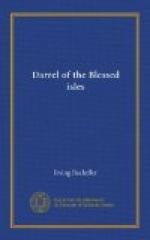“Remember, men, ye cannot reap unless ye sow. If any would reap the corn, he must plant the corn.
“Have ye stood of a bright summer day to watch the little people o’ the field?—those millions that throng the grass an’ fly in the sunlight—bird an’ bee an’ ant an’ bug an’ butterfly? ’Tis a land flowing with milk an’ honey—but hear me, good men, not one o’ them may take as much as would fill the mouth of a cricket unless he pays the price.
“One day I saw an ant trying to rob a thistle-blow. Now the law o’ the field is that none shall have honey who cannot sow for the flower. While a bee probes he gathers the seed-dust in his hairy jacket, an’ away he flies, sowing it far an’ wide. Now, an ant is in no-wise able to serve a thistle-blow, but he is ever trying to rob her house. Knowing her danger, she has put around it a wonderful barricade. Down at the root her stem has a thicket o’ fuzz an’ hair. I watched the little thief, an’ he was a long time passing through it. Then he came on a barrier o’ horny-edged leaves. Underneath they were covered with thick, webby hairs an’ he sank over his head in them an’ toiled long; an’ lo! when he had passed them there was yet another row o’ leaves curving so as to weary an’ bewilder him, an’ thick set with thorns. Slowly he climbed, coming ever to some dread obstruction. By an’ by he stood looking up at the green, round wall o’ the palace. Above him were its treasure an’ its purple dome. He started upward an’ fell suddenly into a moat, full o’ sticky gum, an’ there perished. Men, ‘tis the law o’ God: unless ye sow the seed that bears it, ye shall not have the honey o’ forgiveness. An’ remember the seed o’ forgiveness is forgiveness. If any have been hard upon thee, bearing false witness an’ robbing thee o’ thy freedom an’ thy good name, go not hence until ye forgive.
“Ah, then the White Guard shall no longer sit in the tower.”
The voice had stopped. There was a moment of deep silence. Some power, greater, far greater, than his words, had gone out of the man. Those many who sat before him and they standing there by the door had felt it and were deeply moved. There was a quick stir in the audience—a stir of hands and handkerchiefs. Trove entered; the chaplain was now reading a hymn. Darrel sat behind him on a raised platform, the silken spray upon his brows, long and white as snow, his face thoughtful and serious. The reading over, he came and sat among the men, singing as they sang. The benediction, a stir of feet, and the prisoners began to press about him, some kissing his hands. He gave each a kindly greeting. It was like the night of the party on Cedar Hill. A moment more, and the crowd was filing away, some looking back curiously at Trove, who stood, his arms about the old man.
“Courage, boy!” the latter was saying; “I know it cuts thee like a sword, an’ would to God I could have spared thee even this. Look! in yon high window I can see the sunlight, an’, believe me, there is not a creature it shines upon so happy as I. God love thee, boy, God love thee!”




